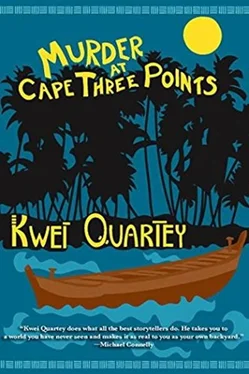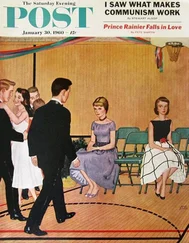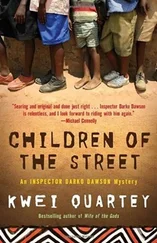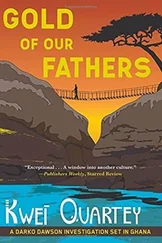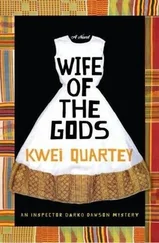“Amazing how nothing ever seems to make sense, isn’t it?” Dawson muttered, bending down and lifting the fronds of a fern. Low-lying plants in a forest were of special significance to him. In the Ketanu case two years ago, the victim was found dead in a thicket with a shrub partially concealing her body.
As expected, they found nothing-not even any signs of disturbance of vegetation. Abandoning the “murder-in-the-bush” theory, they came back, dusting twigs and leaves off their clothes.
“Anything in there?” Cardiman asked them.
Dawson shook his head absently, looking around again. In the distance he saw towering kapok trees with long, straight trunks topped with branches shaped like a fan or umbrella. Much closer, about 200 meters along the road in the direction they had been traveling, Dawson noticed another tree of some size, this one not as tall as a kapok. Its sturdy, widely spread branches, resembling multiple tributaries of a river, overhung the roadway somewhat. He guessed it was a mahogany. It was well situated to function as a lookout for vehicles coming along the route, provided one climbed high enough. He took a photograph of the mahogany with his phone, several snapshots of the Hyundai and surroundings, and the red dirt road in either direction.
“Thank you, Mr. Cardiman. I think I’ve seen all I need.”
As they drove back, the three men were silent until Cardiman said, “I’m concerned about something. I didn’t express it before, but a thought has crossed my mind more than once. Could one or more fishermen in Akwidaa have committed the murder? Maybe they didn’t want the village to be moved to another site, especially since it’s sacred ground to them. Perhaps they would want to get rid of Charles for that reason.”
It was interesting that Cardiman was expressing the same suspicion that Eileen had. On the other hand, maybe Cardiman was trying to shift suspicion away from himself, Dawson reasoned. But he admitted that he did not suspect the resort owner of lying.
He went with Cardiman’s idea to see where it would go. “What do you suggest?”
“Let’s pay a visit to the Nana of Akwidaa,” Cardiman said. “I have a bottle of gin in the back. He’ll expect something from you.”
***
CARDIMAN HAD TO switch to four-wheel drive to climb a steep hill, and when they reached the crest, the beach again appeared in the distance.
“If you go up that way,” he said, pointing to another branch in the road, “you’ll reach the lighthouse, where there’s a splendid view. If you have some time, I highly recommend a visit before you leave Cape Three Points.”
“How far is it?”
“Just fifteen minutes or so from Ezile.”
He coasted down to the village and stopped at its edge in a swirl of dust.
To Dawson, born and bred in a frenetic city, village life seemed to move at a snail’s pace, or to not move at all. It was peaceful, but how did the residents live without electricity and running water? Not that Accra didn’t regularly have power and water failures, he thought wryly. That was almost worse, in a way. These villagers didn’t worry about electricity cuts because there was no electricity to be had. No expectations, no disappointments.
As they entered the village, about a dozen children ranging in age from two to eight came running out to greet them jubilantly. “Mr. Cardiman!” they shouted, dancing around him, tugging at his clothes and putting their arms around him.
“Hi, kids!” he said, beaming and ruffling their heads.
“How are you?” several of them asked repeatedly, practicing their limited English.
“I’m fine, thank you,” he said. “Now line up, come on, come on, you know the drill.” Cardiman winked at Dawson and Chikata. “Got them trained.”
Giggling and jostling, the children got into the semblance of a line, and Cardiman gave each of them a handful of sweets from the plastic bag he was carrying. They took off shrieking with delight, and Cardiman and his two companions continued through the village toward the shore. Some of the houses were of brick, others were wood frames filled in with mud. Dogs, goats, sheep, and chickens wandered freely. They didn’t bother anyone, and no one bothered them. Everyone knew Cardiman it seemed, acknowledging him as he passed by. He took care to greet each of them. Good village etiquette , Dawson thought.
“We’re coming to the chief’s house now,” Cardiman said.
It was a square brick home whose faded blue paint appeared to have run out before the work was finished. One side of the corrugated metal roof was sagging. The front door was ajar. Cardiman knocked. A skinny man in his early fifties came out.
“Good morning, Yao,” Cardiman said.
“Good morning, sir.”
“This is Inspector Dawson and Sergeant Chikata from Accra. They have come to pay respects to Nana Ackah-Yensu. Is he in?”
“Please, he has gone out.”
“Any idea when he’ll return?”
“Please, I think he will come back soon. You can have a seat.”
Yao gestured to two plastic chairs in the corner of the porch. Dawson and Cardiman took the seats, Chikata remained standing, and Yao hovered indecisively.
“Please, I will go and call him to come,” he said, as if it had just occurred to him.
“Thank you, Yao.”
He set off.
“He’s a relative of Ackah-Yensu’s,” Cardiman explained. “He’s a really sweet man, just a little slow mentally, that’s all.”
They waited almost forty-five minutes before the chief arrived. He was a scrawny man in his early sixties, dressed traditionally with yards of richly patterned cloth wrapped around his body and thrown over one shoulder, and he wore it well.
The three men rose to greet him. Dawson presented him with the gin, which Ackah-Yensu graciously accepted.
Yao brought the chief a chair, and he sat down opposite them.
“So, Mr. Dawson and Mr. Chikata, what is your mission here today?”
Speaking in Fante, Dawson told the Nana that apart from his hearing about the esteemed Akwidaa village and wishing to pay his respects to the Nana, he was on business, investigating the death of Charles Smith-Aidoo and his wife.
Nana Ackah-Yensu nodded and smiled and then paused for a long time. “Yes,” he said finally, rubbing his palm slowly up and down his thigh. “I knew Mr. Smith-Aidoo well, and I was very sorry to hear of his death.”
“Nana, I understand he visited you on a few occasions?” Dawson asked.
“Yes.” He didn’t volunteer anything further.
“Please, Nana,” Dawson pressed, laying on a thick coat of deference, “can you tell me the nature of his visits?”
“Hmm,” the chief said, as though considering a choice of ingredients. “Well, the first time he came here, he told me that his company, Malgam, wanted to help some of the villages on the coast of the Western Region, and he asked me what the needs of Akwidaa were, and I told him, you know, just like so many villages in Ghana, we need electricity, and we need running water. It’s simple. No mystery about it. He said he would talk to his people and return.”
He hitched his cloth more securely onto his shoulder. “About two months later, Mr. Smith-Aidoo came back. He said Malgam was going to join the government to provide us with electricity and water. They were making plans. I was very happy. I told him that the next time he comes, he has to meet with all the elders of the village, and he said okay. Then after a few weeks, he met with the elders and me. He brought us all kinds of fine gifts, we poured libation, and then we started the meeting. The elders were eager to know the details of the plans Mr. Smith-Aidoo had for us, and when he started talking it seemed very good to us, but after some few minutes, I realized his message had changed. He said Malgam wanted to do what was in our mutual best interest, and he and his team would like to build a new town they call New Akwidaa, either on the Ezile River or some other place, and tear down Old Akwidaa.”
Читать дальше
